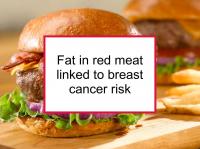High consumption of red meat has been found to be associated with increased risk of breast cancer, especially hormone receptor positive (ER+/PR+) disease, although not all studies are in agreement. The risk appears to be derived primarily from the saturated fat, heterocyclic amine (HCA), and estrogen content of such meat.
Consumption of saturated fat has also been found to be associated with reduced survival after a diagnosis of breast cancer. Now a major new study has reported that animal fat consumption is associated with increased risk of breast cancer.
Meat and breast cancer risk
Intake of saturated fat appears to be associated with breast cancer risk. In particular, high intake of the saturated fats (palmitic acid, palm oil, red meat, butter, lard), margaric acid (beef, lamb, high-fat dairy), and stearic acid (red meat, lard, butter) have been shown to confer significantly high risk.
High consumption of saturated fat is also associated with increased breast density, a powerful breast cancer risk factor.
Cooking meat at high temperature until it is well done produces far higher levels of carcinogens than cooking it until it is medium rare. The char on meat and pan drippings used to make gravies have particularly high levels of HCAs.
U.S. beef contains relatively high levels of estrogen compared to beef produced in other developed countries. One study reported that concentrations of estradiol-17β (E2) and estrone (E1) were significantly higher in beef produced in the U.S. compared to Japan and Brazil. Estrogen levels were found to be higher in fat than in muscle meat. The sources of estrogen in beef include soy-based feed and the use of growth promoters such as zeranol that are routinely administered to cattle.
Latest research finds link between animal fat and breast cancer
The large prospective study referenced at the beginning of this news story was designed to investigate the association between fat consumption and risk of breast cancer. The study included 88,804 initially cancer-free women aged 26 to 45 in the Nurses’ Health Study II. Dietary fat intake was assessed by questionnaire at intake in 1991. Participants were followed for 20 years through 2011. Results were adjusted for demographic, anthropometric, lifestyle, and dietary factors. A total of 2,830 women developed breast cancer during the study period.
Total fat intake was not found to be associated with breast cancer risk. When evaluated separately, intakes of vegetable fat, dairy fat, polyunsaturated fat, and trans fat were not associated with risk. However, animal fat was significantly associated with breast cancer risk — women in the highest fifth of animal fat consumption had an 18% higher risk of breast cancer than those in the lowest fifth. Upon further analysis, this association was shown to be confined to premenopausal women. Higher cholesterol intake was also associated with higher premenopausal breast cancer risk. Higher intakes of saturated fat and monounsaturated fat were each associated with modestly higher breast cancer risk among all women. When the authors adjusted for red meat intake, the associations of saturated fat, monounsaturated fat and animal fat were reduced and no longer statistically significant.
The authors conclude that early adult consumption of animal fat is associated with increased breast cancer risk.
Please see our articles on beef, pork and what ER+/PR+ breast cancer patients and survivors should eat for more information.
